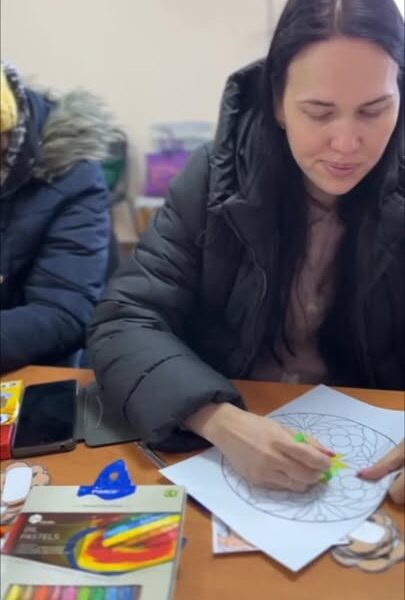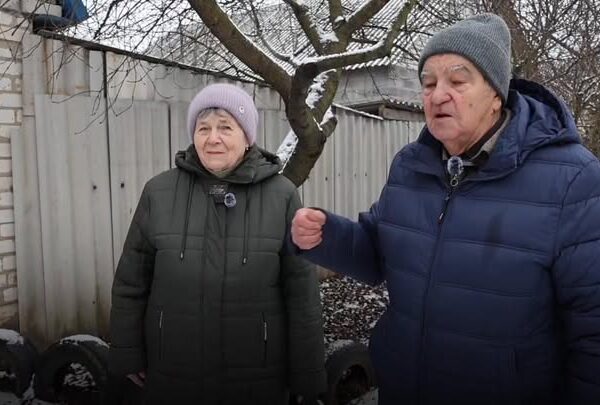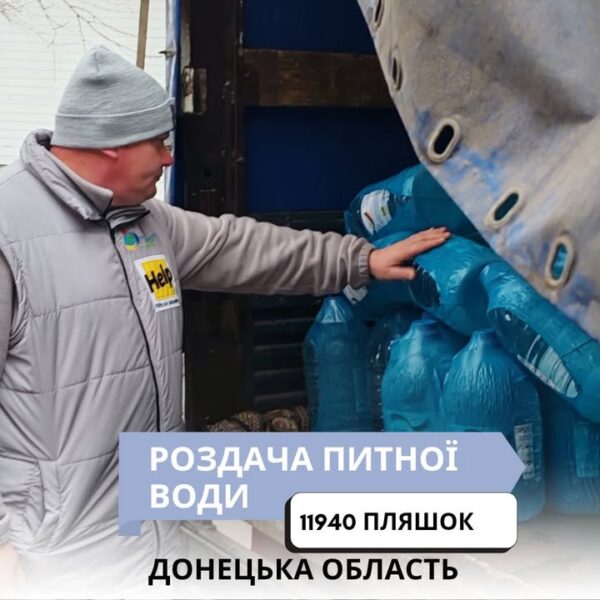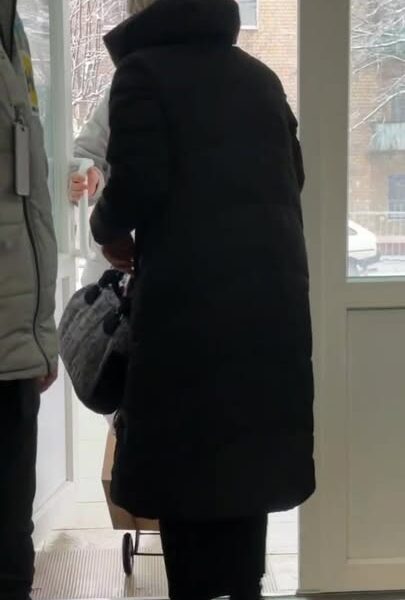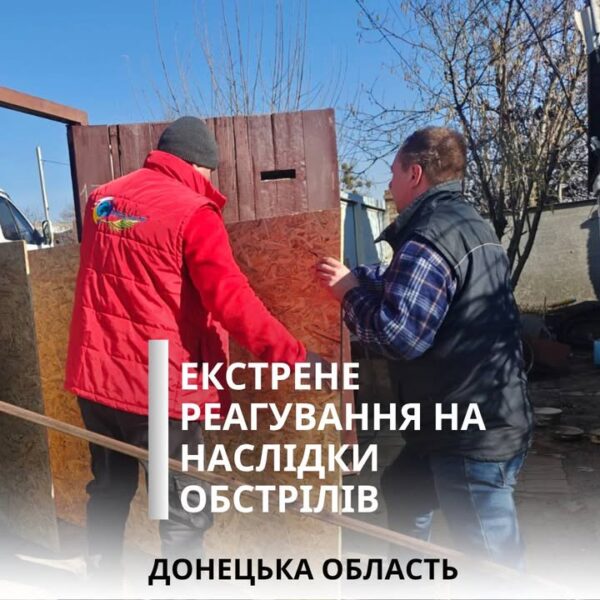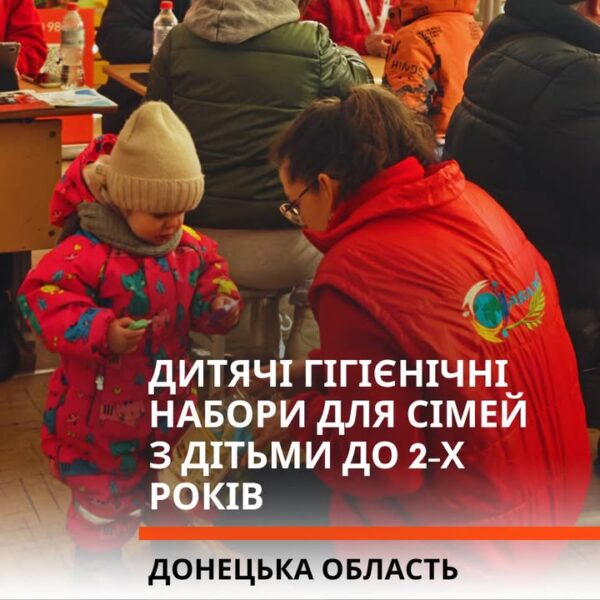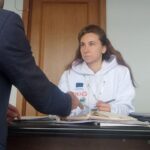
–Ч —З–µ—А–≤–љ—П 2023 —А–Њ–Ї—Г —О—А–Є—Б—В–∞–Љ–Є –У–Ю ¬Ђ¬Ђ–Р–≤–∞–ї—Ц—Б—В¬ї —Г –њ–∞—А—В–љ–µ—А—Б—В–≤—Ц –Ј –Ь—Ц–ґ–љ–∞—А–Њ–і–љ–Њ—О –Њ—А–≥–∞–љ—Ц–Ј–∞—Ж—Ц—Ф—О CARE UkraineвА¶
10.10.2023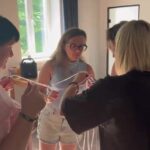
–Ф–Њ 10 –ґ–Њ–≤—В–љ—П – –Т—Б–µ—Б–≤—Ц—В–љ—М–Њ–≥–Њ –і–љ—П –Љ–µ–љ—В–∞–ї—М–љ–Њ–≥–Њ –Ј–і–Њ—А–Њ–≤’—П –Ф—А—Г–Ј—Ц, –њ—А–Є–є—И–Њ–≤ —З–∞—Б –Ј—Г–њ–Є–љ–Є—В–Є—Б—П —Ц –њ–Њ–і–±–∞—В–ЄвА¶
10.10.2023#humanstory #—Ц—Б—В–Њ—А—Ц—Ч–ї—О–і–µ–є
“–ѓ –њ–Њ—Е–Њ–≤–∞–≤ –Ї—Ц–ї—М–Ї–Њ—Е —Б–≤–Њ—Ч—Е –і—А—Г–Ј—Ц–≤ –≤–ї–∞—Б–љ–Њ—А—Г—З, –∞–ї–µ –љ—Ц–Ї–Њ–ї–Є –љ–µ –њ–ї–∞–Ї–∞–≤ –њ—А–Є —Ж—М–Њ–Љ—Г. –Р–ї–µ —В—Г—В —З–Њ–Љ—Г—Б—М –њ–ї–∞—З—Г” – —Ц—Б—В–Њ—А—Ц—П –Ю–ї–µ–≥–∞ —В–∞ –Т–∞–ї–µ–љ—В–Є–љ–Є.
–£ —В–Є—Е–Њ–Љ—Г –Љ—Ц—Б—В–µ—З–Ї—Г –Э–Њ–≤–Њ–Њ–ї–µ–Ї—Б–∞–љ–і—А—Ц–≤–Ї–∞, —Й–Њ –њ–Њ–±–ї–Є–Ј—Г –Ф–љ—Ц–њ—А–∞, —Б—В–Њ—Ч—В—М –±—Г–і–Є–љ–Њ–Ї, —П–Ї–Є–є —Б—В–∞–≤ –њ—А–Є—В—Г–ї–Ї–Њ–Љ –і–ї—П —В–Є—Е, —Е—В–Њ –≤—В—А–∞—В–Є–≤ —Г—Б–µ. –¶–µ –њ—А–Є—В—Г–ї–Њ–Ї –і–ї—П –ї—Ц—В–љ—Ц—Е –ї—О–і–µ–є —В–∞ —Ц–љ–≤–∞–ї—Ц–і—Ц–≤, –Љ—Ц—Б—Ж–µ, –і–µ —А–∞–љ–Є –≤—Ц–є–љ–Є –Ј–∞–ї–Є—И–Є–ї–Є –љ–µ–Ј–≥–ї–∞–і–Є–Љ—Ц —И—А–∞–Љ–Є –љ–∞ –і—Г—И–∞—Е –є–Њ–≥–Њ –Љ–µ—И–Ї–∞–љ—Ж—Ц–≤. –°–µ—А–µ–і –љ–Є—Е –Ю–ї–µ–≥ —Ц –Т–∞–ї–µ–љ—В–Є–љ–∞, –њ–Њ–і—А—Г–ґ–ґ—П, —П–Ї–Њ–Љ—Г –Ј–∞ —Б—Ц–Љ–і–µ—Б—П—В, –Љ–∞—О—В—М —Ц—Б—В–Њ—А—Ц—О –Ї–Њ—Е–∞–љ–љ—П, —Б—В—Ц–є–Ї–Њ—Б—В—Ц —В–∞ –љ–µ—А–Њ–Ј—А–Є–≤–љ–Њ–≥–Њ –Ј–≤’—П–Ј–Ї—Г, —Й–Њ –њ–Њ–≤’—П–Ј—Г—Ф —Ч—Е —А–∞–Ј–Њ–Љ.
–¶–µ–є –±—Г–і–Є–љ–Њ–Ї, –њ—А–Є—В—Г–ї–Њ–Ї –љ–∞–і—Ц—Ч, –±—Г–≤ —Й–µ–і—А–Њ –Ј–∞–њ—А–Њ–њ–Њ–љ–Њ–≤–∞–љ–Є–є –≤–ї–∞—Б–љ–Є–Ї–Њ–Љ –і–ї—П —В–Є—Е, —Е—В–Њ –≤—В—Ц–Ї–∞–≤ –Ј –Њ—Е–Њ–њ–ї–µ–љ–Є—Е –≤—Ц–є–љ–Њ—О —А–∞–є–Њ–љ—Ц–≤ –С–∞—Е–Љ—Г—В–∞, –Ы–Є—Б–Є—З–∞–љ—Б—М–Ї–∞ —В–∞ –Ф–Њ–љ–µ—Ж—М–Ї–∞. –Т—Ц—Б—Ц–Љ–љ–∞–і—Ж—П—В—М –Њ—Б—Ц–± –Ј–љ–∞–є—И–ї–Є –њ—А–Є—В—Г–ї–Њ–Ї —Г –є–Њ–≥–Њ —Б—В—Ц–љ–∞—Е, –≤—Ц—Б—Ц–Љ –Ј –љ–Є—Е – –≤–і–Њ–≤–Є –∞–±–Њ –≤–і—Ц–≤—Ж—Ц, —И–µ—Б—В–µ—А–Њ –њ—А–Є–Ї—Г—В—Ц –і–Њ –ї—Ц–ґ–Ї–∞, –∞ –і–µ—Е—В–Њ –Ј –љ–Є—Е – –Ј —В—П–≥–∞—А–µ–Љ —Ц–љ–≤–∞–ї—Ц–і–љ–Њ—Б—В—Ц. –¶–µ –ї—О–і–Є, —П–Ї—Ц –≤—В—А–∞—В–Є–ї–Є –≤—Б—Ц—Е, —Е—В–Њ –±—Г–≤ —Ч–Љ –і–Њ—А–Њ–≥–Є–є.
CARE –њ—А–Є—Ч—Е–∞–ї–∞ —Б—О–і–Є –Ј –Љ–Њ–±—Ц–ї—М–љ–Њ—О –Ї–Њ–Љ–∞–љ–і–Њ—О –њ—Б–Є—Е–Њ–ї–Њ–≥—Ц–≤ —В–∞ —Б–Њ—Ж—Ц–∞–ї—М–љ–Є—Е –њ—А–∞—Ж—Ц–≤–љ–Є–Ї—Ц–≤ –≥—А–Њ–Љ–∞–і—Б—М–Ї–Њ—Ч –Њ—А–≥–∞–љ—Ц–Ј–∞—Ж—Ц—Ч –Р–≤–∞–ї—Ц—Б—В –Ј–∞ –њ—Ц–і—В—А–Є–Љ–Ї–Є –Ь—Ц–љ—Ц—Б—В–µ—А—Б—В–≤–∞ –Ј–∞–Ї–Њ—А–і–Њ–љ–љ–Є—Е —Б–њ—А–∞–≤ –І–µ—Е—Ц—Ч –Љ–Є –њ—А–Њ–≤–Њ–і–Є–Љ–Њ —В—Г—В —Ц–љ–і–Є–≤—Ц–і—Г–∞–ї—М–љ—Ц –Ї–Њ–љ—Б—Г–ї—М—В–∞—Ж—Ц—Ч —В–∞ –≥—А—Г–њ–Њ–≤—Ц —В–µ—А–∞–њ–µ–≤—В–Є—З–љ—Ц –Ј–∞–љ—П—В—В—П, —П–Ї—Ц –њ–Њ–≤–µ—А—В–∞—О—В—М —Ж–Є–Љ –ї—О–і—П–Љ –љ–∞–і—Ц—О —В–∞ –±–∞–ґ–∞–љ–љ—П –ґ–Є—В–Є.
–Ю–ї–µ–≥, —З–Њ–ї–Њ–≤—Ц–Ї, –љ–∞ –і–Њ–ї—О —П–Ї–Њ–≥–Њ –≤–Є–њ–∞–ї–Є –≤–Є–њ—А–Њ–±—Г–≤–∞–љ–љ—П, —П–Ї—Ц –Ј–ї–∞–Љ–∞–ї–Є –± –±–∞–≥–∞—В—М–Њ—Е, –љ–µ—Б–µ –љ–∞ —Б–Њ–±—Ц —И—А–∞–Љ–Є –≤—Ц–є–љ–Є —В–∞ –≤—Ц–Ї—Г. –Я—Ц–і —З–∞—Б –Ї–Њ–љ—Д–ї—Ц–Ї—В—Г –≤—Ц–љ –≤—В—А–∞—В–Є–≤ –љ–Њ–≥—Г, –∞–ї–µ —З–µ—А–µ–Ј –њ–Њ—Е–Є–ї–Є–є –≤—Ц–Ї –є–Њ–Љ—Г –≤—Ц–і–Љ–Њ–≤–Є–ї–Є –≤ –њ—А–Њ—В–µ–Ј—Г–≤–∞–љ–љ—Ц. –¶–µ –Ј–∞–љ—Г—А–Є–ї–Њ –є–Њ–≥–Њ –≤ –≥–ї–Є–±–Њ–Ї—Г –і–µ–њ—А–µ—Б—Ц—О. –Ж–љ—Б—Г–ї—М—В, –Ї–ї—Ц–љ—Ц—З–љ–∞ —Б–Љ–µ—А—В—М, —Ц —В–µ–њ–µ—А –≤—Ц–љ –њ–µ—А–µ—Б—Г–≤–∞—Ф—В—М—Б—П –њ–Њ –ґ–Є—В—В—О –≤ —Ц–љ–≤–∞–ї—Ц–і–љ–Њ–Љ—Г –≤—Ц–Ј–Ї—Г. –Т–∞–ї–µ–љ—В–Є–љ–∞, –є–Њ–≥–Њ –≤—Ц—А–љ–∞ –і—А—Г–ґ–Є–љ–∞, —Ф –є–Њ–≥–Њ –њ—Ц–і—В—А–Є–Љ–Ї–Њ—О. –†–∞–Ј–Њ–Љ –≤–Њ–љ–Є –і—Ц–ї—П—В—М —Б–≤—Ц–є –і—Ц–Љ –Ј –≤—Ц—А–љ–Є–Љ —Б–Њ–±–∞–Ї–Њ—О-–Ї–Њ–Љ–њ–∞–љ—М–є–Њ–љ–Њ–Љ.
–Т–∞–ї–µ–љ—В–Є–љ–∞ –Ј–≥–∞–і—Г—Ф –≤–∞–ґ–Ї—Ц –і–љ—Ц. “–Э–∞—И –±—Г–і–Є–љ–Њ–Ї –±—Г–≤ –Ј—А—Г–є–љ–Њ–≤–∞–љ–Є–є. –ѓ –і—Ц–Ј–љ–∞–ї–∞—Б—П –њ—А–Њ –Ј–∞–≥–Є–±–µ–ї—М —Б–Є–љ–∞ —Ц –љ—Ц–і–µ –љ–µ –Љ–Њ–≥–ї–∞ –Ј–љ–∞–є—В–Є –Ю–ї–µ–≥–∞. –ѓ –Њ–њ–Є–љ–Є–ї–∞—Б—П –љ–∞ –≤—Г–ї–Є—Ж—Ц –Ј –љ–∞—И–Є–Љ —Б–Њ–±–∞–Ї–Њ—О”. –°—В—А–∞–ґ–і–∞—О—З–Є –≤—Ц–і –≤—Ц–і—З–∞—О —Ц –≥–Њ–ї–Њ–і—Г, –≤–Њ–љ–∞ –Ј—Г—Б—В—А—Ц–ї–∞ –љ–∞ –≤–Њ–Ї–Ј–∞–ї—Ц –≥—А—Г–њ—Г –≤–Њ–ї–Њ–љ—В–µ—А—Ц–≤, —П–Ї—Ц –і–Њ–њ–Њ–Љ–Њ–≥–ї–Є —Ч–є –Ј–љ–∞–є—В–Є —З–Њ–ї–Њ–≤—Ц–Ї–∞, —П–Ї–Є–є —П–Ї—А–∞–Ј –њ–µ—А–µ–±—Г–≤–∞–≤ —Г –ї—Ц–Ї–∞—А–љ—Ц –њ—Ц—Б–ї—П –∞–Љ–њ—Г—В–∞—Ж—Ц—Ч.
–°–∞–Љ–µ –≤–Њ–ї–Њ–љ—В–µ—А–Є –і–Њ–њ–Њ–Љ–Њ–≥–ї–Є —Б—Ц–Љ’—Ч –Ј–≥–Њ–і–Њ–Љ –Ј–љ–∞–є—В–Є —Ж–µ–є –њ—А–Є—В—Г–ї–Њ–Ї. –Ґ—Г—В –љ–µ–Љ–∞—Ф –њ—А–Њ—В–Њ—З–љ–Њ—Ч –≤–Њ–і–Є. –З–Љ –і–Њ–≤–Њ–і–Є—В—М—Б—П –≤–Є–ґ–Є–≤–∞—В–Є –љ–∞ 50 —Ф–≤—А–Њ –љ–∞ –Љ—Ц—Б—П—Ж—М, —П–Ї—Ц –≤–Њ–љ–Є –Њ—В—А–Є–Љ—Г—О—В—М –≤—Ц–і –і–µ—А–ґ–∞–≤–Є —П–Ї –≤–љ—Г—В—А—Ц—И–љ—М–Њ –њ–µ—А–µ–Љ—Ц—Й–µ–љ—Ц –Њ—Б–Њ–±–Є. –С—Ц–ї—М –Т–∞–ї–µ–љ—В–Є–љ–Є –њ–Њ—Б–Є–ї—О—Ф—В—М—Б—П, –Ї–Њ–ї–Є —Ч–є –і–Њ–≤–Њ–і–Є—В—М—Б—П –Ј–∞–ї–Є—И–∞—В–Є –Ю–ї–µ–≥–∞ –Њ–і–љ–Њ–≥–Њ, –Ї–Њ–ї–Є –≤–Њ–љ–∞ —Ч–і–µ –≤ –Љ—Ц—Б—В–Њ —Г —Б–њ—А–∞–≤–∞—Е. –©–Њ—А–∞–Ј—Г, –Ї–Њ–ї–Є –≤–Њ–љ–∞ –њ–Њ–≤–µ—А—В–∞—Ф—В—М—Б—П, —В–Њ –Ј–∞—Б—В–∞—Ф –є–Њ–≥–Њ –≤ —Б–ї—М–Њ–Ј–∞—Е —Ц –і–µ–њ—А–µ—Б—Ц—Ч.
“–Ь–Є —А–∞–Ј–Њ–Љ –≤–ґ–µ –±—Ц–ї—М—И–µ 20 —А–Њ–Ї—Ц–≤, —Ц —Ж—М–Њ–≥–Њ —А–Њ–Ї—Г –љ–∞–Љ –≤–Є–њ–Њ–≤–љ–Є—В—М—Б—П 21 —А—Ц–Ї”, – –Ј –њ–Њ—Б–Љ—Ц—И–Ї–Њ—О —А–Њ–Ј–њ–Њ–≤—Ц–і–∞—Ф –Т–∞–ї–µ–љ—В–Є–љ–∞.
–Ю–ї–µ–≥, —З–Њ–ї–Њ–≤—Ц–Ї, —Б—Д–Њ—А–Љ–Њ–≤–∞–љ–Є–є –љ–∞–є—Б—Г–≤–Њ—А—Ц—И–Є–Љ–Є –ґ–Є—В—В—Ф–≤–Є–Љ–Є –≤–Є–њ—А–Њ–±—Г–≤–∞–љ–љ—П–Љ–Є, —А–Њ–Ј–Љ—Ц—А–Ї–Њ–≤—Г—Ф –њ—А–Њ —Ц—А–Њ–љ—Ц—О —Б–≤–Њ—Ч—Е —Б–ї—Ц–Ј. “–Т–Њ–љ–∞ –Ї–∞–ґ–µ, —Й–Њ —П –Љ–Њ–ґ—Г –њ–ї–∞–Ї–∞—В–Є, –∞–ї–µ —З–Њ–ї–Њ–≤—Ц–Ї–Є –љ–µ –њ–Њ–≤–Є–љ–љ—Ц –њ–ї–∞–Ї–∞—В–Є. –ѓ –≤–Њ—О–≤–∞–≤ –≤ –Р—Д–≥–∞–љ—Ц—Б—В–∞–љ—Ц, –≤–ї–∞—Б–љ–Њ—А—Г—З –њ–Њ—Е–Њ–≤–∞–≤ –Ї—Ц–ї—М–Ї–Њ—Е —Б–≤–Њ—Ч—Е –і—А—Г–Ј—Ц–≤, –∞–ї–µ –љ—Ц–Ї–Њ–ї–Є –љ–µ –њ–ї–∞–Ї–∞–≤. –Р —В—Г—В —З–Њ–Љ—Г—Б—М –њ–ї–∞—З—Г”.
–Т–∞–ї–µ–љ—В–Є–љ–∞ —А–Њ–Ј—Г–Љ—Ц—Ф —Б–Є–ї—Г —Б–ї–Њ–≤–∞ —Ц –Ј—Ж—Ц–ї–µ–љ–љ—П, —П–Ї–µ –њ—А–Є—Е–Њ–і–Є—В—М –≤—Ц–і —В–Њ–≥–Њ, —Й–Њ —Ч—Ч –њ–Њ—З—Г–ї–Є. “–Щ–Њ–Љ—Г –і—Г–ґ–µ –і–Њ–њ–Њ–Љ–∞–≥–∞—Ф –Љ–Њ–ґ–ї–Є–≤—Ц—Б—В—М –≤–Є—Б–ї–Њ–≤–Є—В–Є—Б—П, –±—Г—В–Є –њ–Њ—З—Г—В–Є–Љ. –Щ–Њ–Љ—Г —Б—В–∞—Ф –ї–µ–≥—И–µ”, – —А–Њ–Ј–њ–Њ–≤—Ц–і–∞—Ф –≤–Њ–љ–∞ –њ—А–Њ —В–µ—А–∞–њ–µ–≤—В–Є—З–љ—Ц —Б–µ–∞–љ—Б–Є, –Њ—А–≥–∞–љ—Ц–Ј–Њ–≤–∞–љ—Ц –Ј–∞ –њ—Ц–і—В—А–Є–Љ–Ї–Є CARE.
–Ж—Б—В–Њ—А—Ц—П –Ю–ї–µ–≥–∞ —В–∞ –Т–∞–ї–µ–љ—В–Є–љ–Є —Б–≤—Ц–і—З–Є—В—М –њ—А–Њ –Ї—А–Є—В–Є—З–љ—Г –≤–∞–ґ–ї–Є–≤—Ц—Б—В—М –њ—А–Њ–≥—А–∞–Љ –њ—Б–Є—Е–Њ—Б–Њ—Ж—Ц–∞–ї—М–љ–Њ—Ч –њ—Ц–і—В—А–Є–Љ–Ї–Є –≤ –£–Ї—А–∞—Ч–љ—Ц. –Ч–∞–љ–∞–і—В–Њ —З–∞—Б—В–Њ –Љ–Є –Ј–∞–±—Г–≤–∞—Ф–Љ–Њ –њ—А–Њ –Њ—Б–Њ–±–Є—Б—В–Є–є –±—Ц–ї—М –Љ—Ц–ї—М–є–Њ–љ—Ц–≤ –ї—О–і–µ–є, —П–Ї—Ц —Б—В—А–∞–ґ–і–∞—О—В—М –≤—Ц–і –Ї–Њ–љ—Д–ї—Ц–Ї—В—Г, —Е–Њ–≤–∞—О—З–Є –є–Њ–≥–Њ –Ј–∞ —Б—В–∞—В–Є—Б—В–Є–Ї–Њ—О —Ц —Ж–Є—Д—А–∞–Љ–Є. –Р–ї–µ –≤ —В–Њ–є –ґ–µ —З–∞—Б –љ–µ–±–∞–є–і—Г–ґ–µ —Б—В–∞–≤–ї–µ–љ–љ—П –і–Њ–≤–Ї–Њ–ї–Є—И–љ—Ц—Е —Б—В–∞—Ф –њ—А–Њ–Љ–µ–љ–µ–Љ –љ–∞–і—Ц—Ч –љ–∞–≤—Ц—В—М —Г —В–∞–Ї–Є—Е —Б–Ї–ї–∞–і–љ–Є—Е —Б–Є—В—Г–∞—Ж—Ц—П—Е.
ENG
вАЬI buried several of my friends with my own hands, but I never cried at that. But somehow I cry here” – Oleh and Valentyna’s Story from Novooleksandrivka
In the quiet town of Novooleksandrivka, near Dnipro, there stands a house that has become a sanctuary for those who have lost everything. It is a refuge for the elderly and disabled, a place where the wounds of war have left indelible scars on the souls of its inhabitants. Among them, Oleh and Valentyna, a couple in their seventies, have a story of love, resilience, and the unbreakable bond that ties them together.
The house, a haven of hope, was generously offered by owner for refugees from the war-torn regions of Bakhmut, Lysychansk, and Donetsk. Eighteen souls have found shelter within its walls, eight of them widows or widowers, six bedridden, and some dealing with the weight of disability. These are people who have lost everyone they held dear.
CARE came here with a mobile team of psychologists and social workers from the Avalyst NGO. With the support of the Czech Ministry of Foreign Affairs, they conduct individual counseling and group therapy sessions that restore hope and a desire for life to these people.
Oleh, a man who has faced trials that would have broken many, bears the scars of both war and age. He lost his leg during the conflict, but due to his advanced years, he was denied a prosthetic limb. The weight of this loss bore down on him, plunging him into the depths of depression. A stroke, a brief encounter with clinical death, and now, he navigates life in a wheelchair. Valentyna, his steadfast wife, is his rock. Together, they share their home with a faithful canine companion.
Valentyna recalls the hard days. “Our house was destroyed. I learned about the death of my son and could not find Oleh anywhere. I ended up on the street with our dog.” Suffering from despair and hunger, she met a group of volunteers at the train station who helped her find Oleh, who was in the hospital after an amputation.
It was volunteers who helped them find this shelter. There is no running water here. They have to survive on the 50 euros a month they receive from the state as internally displaced persons. Valentyna’s pain deepens when she has to leave Oleh alone while she goes to the city on business. Every time she returns, she finds him in tears and depressed.
“We have been together for over 20 years, and this year we will turn 21,” Valentyna says with a smile.
Oleh, a man molded by life’s harshest trials, reflects on the irony of his tears. “She tells me I can cry, but men are not supposed to cry. I fought in Afghanistan, I buried several of my friends with my own hands, but I never cried at that. But somehow I cry here.”
Valentyna understands the power of words and the healing that comes from being heard. “It helps a lot to be able to speak out, to be heard. It makes him feel better”, she says of the therapy sessions organized with the support of CARE.
The story of Oleg and Valentyna is a testament to the critical importance of psychosocial support programs in Ukraine. Too often we forget about the personal pain of millions of people suffering from the conflict, hiding it behind statistics and numbers. But at the same time, the caring attitude of those around us becomes a ray of hope even in such difficult situations.
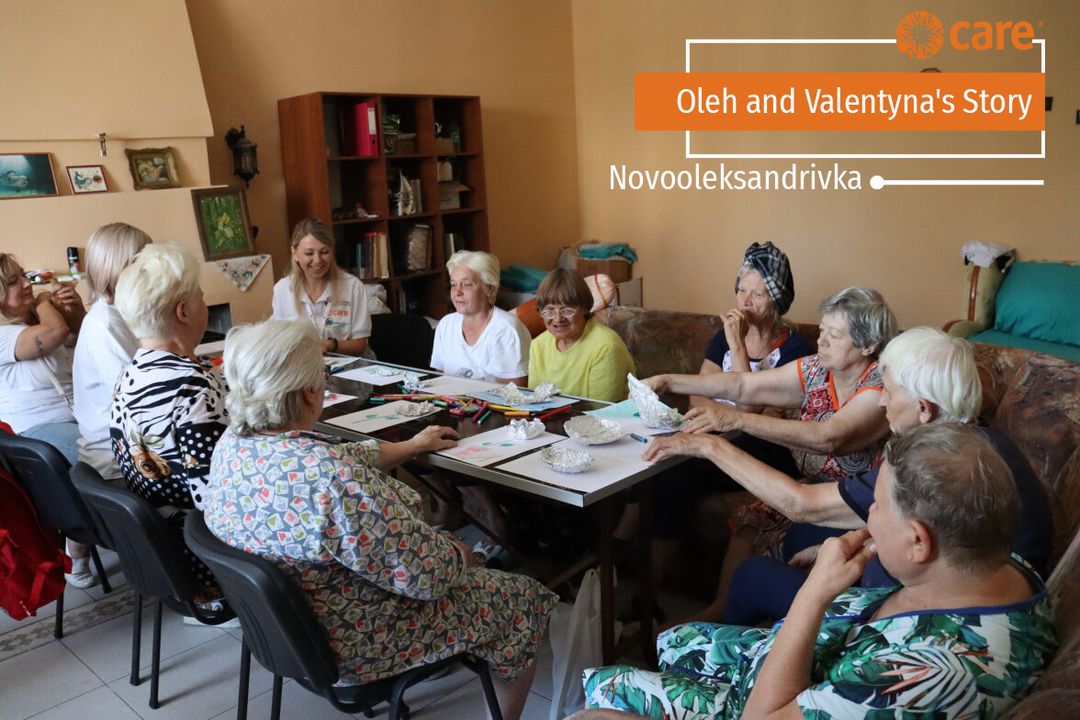
–Я–µ—А–µ–≥–ї—П–і—Ц–≤: 0
